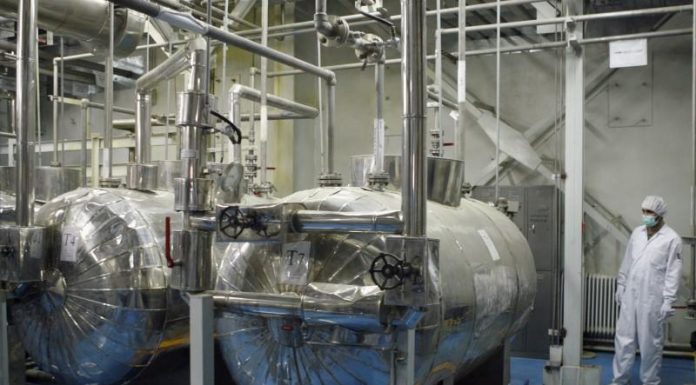By Francois Murphy
VIENNA, June 14 (Reuters) – Iran has multiplied the speed at which it enriches uranium but it is still far from the maximum rate possible under its nuclear deal with major powers, meaning it would be months before production ceilings are hit, diplomats who follow it say.
Against a backdrop of rising tensions with the United States, which pulled out of the 2015 deal a year ago and has since imposed ever more punishing economic sanctions against Tehran, Iran has stayed within the deal’s key limits while threatening to discard at least some of them.
Since it withdrew from the deal, Washington has reinstated its sanctions against Tehran and added new ones in a bid to isolate the Islamic Republic – an effort Iran calls “economic terrorism”.
Iran‘s response has included accelerating uranium enrichment, which is allowed under the deal but shortens the time in which it will reach the deal’s cap on its stock of enriched uranium.
Inspectors from the U.N. atomic watchdog, which is policing the deal’s nuclear restrictions, told member states last week that Iran has accelerated its uranium enrichment to around 12 kg a month, roughly three times the previous rate, diplomats who attended the quarterly technical briefing said.
The watchdog’s chief Yukiya Amano confirmed the acceleration this week but declined to elaborate.
If it continues producing at that rate, Iran is likely to hit the deal’s 202.8 kg limit on its enriched uranium stock in around two months. Its stock was 174.1 kg on May 20, the Vienna-based International Atomic Energy Agency’s last quarterly report said.
A new mode of operation enabling the acceleration was observed on May 22, the IAEA told member states, according to diplomats who attended.
Exceeding the uranium cap at the heart of the deal would prompt a diplomatic crisis, forcing the other signatories to confront Iran. European powers have scrambled to do what little they can to shield Iran from U.S. sanctions in a bid to convince it not to abandon the deal and ramp up its nuclear activities.
Iran could still produce enriched uranium much faster even without breaching the deal, which was aimed at extending the time Iran would need to produce enough highly enriched uranium for a nuclear weapon if it chose to.
“COULD BE WORSE”
Diplomats in Vienna who monitor its progress closely say Iran is capable of hitting the uranium ceiling in as little as 10 days, which shows the latest acceleration is relatively moderate.
“They could really put a knife to our throats,” one diplomat said, referring to the pressure that would put on other signatories to respond.
What Iran plans to do is unclear, but the IAEA told member states that Tehran is also on course to hit another of the deal’s limits, on heavy water, a material less directly linked to proliferation than enriched uranium, in mid- to late August, diplomats say.
But the points at which Iran is set to hit the uranium and heavy water limits are later than the date in early July by which Iran has said its economy must be shielded properly from U.S. sanctions or it will enrich uranium to a higher level than the 3.67 percent allowed by the deal.
European powers have already said they reject such “ultimatums”.
(Reporting by Francois Murphy; Editing by Toby Chopra)


